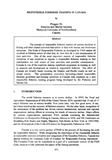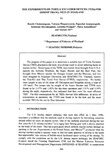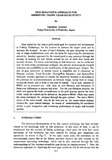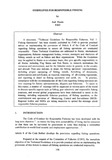Proceedings of the Regional Workshop on Responsible Fishing, Bangkok, Thailand, 24-27 June 1997
Dicari oleh
Dimuat Naik Baru-baru ini
-
Cooperative Research Networking to Facilitate Research and Development for the Reduction of Wastage in Shrimp Fisheries
(Training Department, Southeast Asian Fisheries Development Center, 1997)Because of the importance of shrimp trawling fisheries in a number of countries in Asia and the Indian Ocean region and recommendations for more research work in the field of selectivity, in particular through more cooperation ... -
Cooperative Research in Asian Fisheries-future Directions and Opportunities
(Training Department, Southeast Asian Fisheries Development Center, 1997)The fisheries of many countries in Asia are heavily reliant upon fisheries as a major source of food protein with fish consumption levels two to three times higher than those of western countries and collectively, the ... -
Ghostfishing Problems and Prevention
(Training Department, Southeast Asian Fisheries Development Center, 1997)Ghostfishing is the fishing activity of lost or abandoned fishing gears or theirarts. This invisible fishing activity of unknown number of fishing gears may have contributed the global depletion of fisheries resources. ... -
Inmarsat's Role in Responsible Fishing
(Training Department, Southeast Asian Fisheries Development Center, 1997)The paper documents the the application of the services of International Maritime Satellite Organization (Inmarsat) to responsible fisheries. Currently known as International Mobile Satellite Organization, offers an ... -
Training and Extension Programs on Responsible Fishing in Thailand
(Training Department, Southeast Asian Fisheries Development Center, 1997)The marine fisheries status has declined in stock and become very critical issue at present. Fisheries regulations and notifications have been issued for solving the problems of fisheries management. Responsible fishing ... -
Training and Extension Program on Responsible Fishing in Indonesia
(Training Department, Southeast Asian Fisheries Development Center, 1997)Series of research and seminars were currently carried out in Indonesia to build sufficient scientific evidences in formulating national policy on Responsible Fishing. With those activities, it is expected that suitable ... -
Training and Extension on Selective Fishing in the Philippines
(Training Department, Southeast Asian Fisheries Development Center, 1997)Effective conservation and management of the Philippine fishery and aquatic resources must be given due considerations. The Code of Conduct for Responsible Fisheries specifically on Article 7, Section 7.1.1 on Fisheries ... -
Responsible Fisheries Training in Canada
(Training Department, Southeast Asian Fisheries Development Center, 1997)The concept of responsible fisheries matters all parties involved in fishing and other related activities that utilize or deal with marine and freshwater resources. The Code of Responsible Fisheries as developed by FAO ... -
Moving towards more Responsible Fishing Practices in Australia s Northern Prawn Fishery
(Training Department, Southeast Asian Fisheries Development Center, 1997)Bycatch in Australia s Northern Prawn Fishery (NPF) is extremely diverse in both species and size composition. This makes developing responsible fishing practices to reduce the amount of bycatch in the NPF, a complex ... -
Application of the Australian Trawl Efficiency Device in Australia s Northern Prawn Fishery
(Training Department, Southeast Asian Fisheries Development Center, 1997)The following paper is made up of three field trip reports covering the testing and commercial use of the Australia Trawl Efficiency Device (AusTED). The work was carried out in the Northern Prawn Fishery (NPF) aboard five ... -
Southeast United States Fisheries Bycatch Reduction Research in Shrimp Trawl Fisheries
(Training Department, Southeast Asian Fisheries Development Center, 1997)Presented in the paper are the two devices that were developed by some states in the southeast United States to reduce fisheries bycatch in shrimp trawls. These were Turtle Excluder Device (TED) and Bycatch Reduction Device ... -
Study on Turtle Excluder and By-catch Reduction Devices in the Philippines
(Training Department, Southeast Asian Fisheries Development Center, 1997)Experimental test-fishing of different TED types, namely : modified Thai Turtle Free Device (TTFD), Super Shooter (SS) and Hooped TED were conducted for eight (8) fishing days in March and April 1997 in Manila Bay. Assessment ... -
Experiments on the Use of Turtle Excluder Devices (TEDs) in Malaysian Waters
(Training Department, Southeast Asian Fisheries Development Center, 1997)Trawl experiments deploying a research vessel and two chartered fishermen s boats were conducted to study the suitability of different types of Turtle Excluder Devices attached to the local shrimp trawl nets. A total of ... -
The Experiments on Turtle Excluder Devices (TEDs) for Shrimp Trawl Nets in Thailand
(Training Department, Southeast Asian Fisheries Development Center, 1997)The purpose of this paper is to determine a suitable type of Turtle Excluder Device (TED) attached to the body of a shrimp trawl to avoid inflicting harm on marine turtles. Seven types of the TEDs were tested; three brought ... -
Fish Behaviour Approach for Improving Trawl Gear Selectivity
(Training Department, Southeast Asian Fisheries Development Center, 1997)Gear selectivity has been a gold-medal goal for research and development in Fishing Technology, for the purpose to increase the target catch and to decrease the bycatch. In case of trawl fisheries, the gear designing by ... -
Methodology of Evaluating Selectivity Performance - Two Selective Processes of Trawl Sorting Devices: Fish Encountering and Being Sieved
(Training Department, Southeast Asian Fisheries Development Center, 1997)The mesh selectivity of each mesh size is a basic study for size-sorting, and usually expresses the proportion retained as a function of the body length of a fish. It is however likely to depend more directly on the ... -
Discards in Japanese Marine Capture Fisheries and their Estimation
(Training Department, Southeast Asian Fisheries Development Center, 1997)By catch focused here is incidental catch to be discarded at sea and those utilised is dealt little. This is because, as widely stated, by catch is not necessarily a negative practice as there are many fisheries which are ... -
Methodology to Estimate Bycatch and Discards
(Training Department, Southeast Asian Fisheries Development Center, 1997)FAO Fisheries Technical Paper 339 (1994) provided the first estimation of global bycatch and discards, however, the estimated discards of 27 million tons have been abolished at FAO Consultation Meeting in Tokyo (1996). ... -
Guidelines for Responsible Fishing
(Training Department, Southeast Asian Fisheries Development Center, 1997)A document, Technical Guidelines for Responsible Fisheries, Vol. 1: Fishing Operations has been recently published by FAO to provide practical advice on implementing the provisions of Article 8 of the Code of Conduct ... -
Strategy for the Implementation of the Code of Conduct for Responsible Fisheries
(Training Department, Southeast Asian Fisheries Development Center, 1997)This paper presents the strategy for the implementation of the Code of Conduct for Responsible Fisheries (CCRF). CCRF was adopted by the Twenty-eighth Session of the FAO Conference in October 1995. It is of a voluntary ...




















